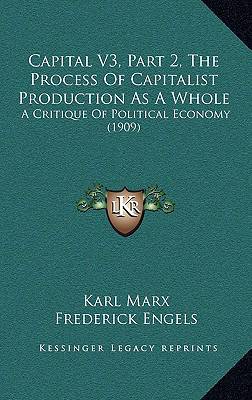
- Afhalen na 1 uur in een winkel met voorraad
- Gratis thuislevering in België vanaf € 30
- Ruim aanbod met 7 miljoen producten
- Afhalen na 1 uur in een winkel met voorraad
- Gratis thuislevering in België vanaf € 30
- Ruim aanbod met 7 miljoen producten
Zoeken
Capital V3, Part 2, The Process Of Capitalist Production As A Whole
A Critique Of Political Economy (1909)
Karl Marx
Hardcover | Engels
€ 65,45
+ 130 punten
Uitvoering
Omschrijving
Capital V3, Part 2, The Process Of Capitalist Production As A Whole: A Critique Of Political Economy (1909) is a book written by Karl Marx, one of the most influential figures in the field of political philosophy and economics. This book is a continuation of Marx's analysis of the capitalist system, focusing on the process of production as a whole.In this book, Marx critiques the political economy of capitalism, arguing that it is inherently exploitative and unjust. He explores the relationship between labor and capital, and how the capitalist system perpetuates inequality and oppression. Marx also examines the role of technology and machinery in the production process, and how they are used to further exploit workers.Throughout the book, Marx provides a detailed analysis of the workings of the capitalist system, including the circulation of capital, the accumulation of wealth, and the role of the state in regulating and maintaining the system. He also discusses the impact of imperialism and colonialism on the capitalist system, and how they are used to maintain power and control over oppressed peoples.Overall, Capital V3, Part 2, The Process Of Capitalist Production As A Whole: A Critique Of Political Economy (1909) is a seminal work in the field of political philosophy and economics, providing a comprehensive analysis of the capitalist system and its inherent flaws. It remains an important text for anyone interested in understanding the workings of capitalism and the struggle for social and economic justice.This scarce antiquarian book is a facsimile reprint of the old original and may contain some imperfections such as library marks and notations. Because we believe this work is culturally important, we have made it available as part of our commitment for protecting, preserving, and promoting the world's literature in affordable, high quality, modern editions, that are true to their original work.
Specificaties
Betrokkenen
- Auteur(s):
- Uitgeverij:
Inhoud
- Aantal bladzijden:
- 330
- Taal:
- Engels
Eigenschappen
- Productcode (EAN):
- 9781167315770
- Verschijningsdatum:
- 10/09/2010
- Uitvoering:
- Hardcover
- Formaat:
- Genaaid
- Afmetingen:
- 152 mm x 229 mm
- Gewicht:
- 653 g

Alleen bij Standaard Boekhandel
+ 130 punten op je klantenkaart van Standaard Boekhandel
Beoordelingen
We publiceren alleen reviews die voldoen aan de voorwaarden voor reviews. Bekijk onze voorwaarden voor reviews.











